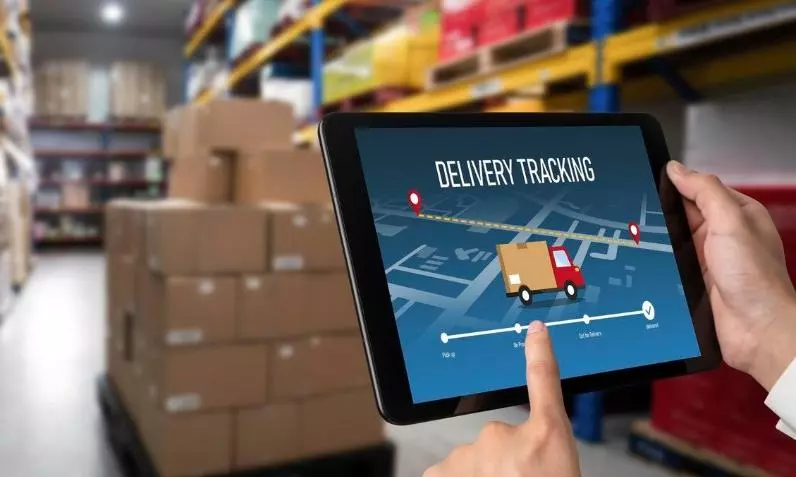How tech startups are transforming logistics in digital India

As legacy systems give way to digital networks, Indian logistics tech startups are powering agile, data-driven supply chains.
India's logistics landscape is experiencing a transformative shift, propelled by innovative technology startups that are redefining how goods move across the country. As the world's fourth-largest economy continues its digital transformation journey, logistics tech startups are emerging as critical enablers of this evolution, bridging the gap between traditional supply chain operations and the demands of modern commerce.
The digital logistics renaissance
According to data from Grand View Research, India’s logistics market was valued at USD 228.4 billion in 2024 and is projected to grow to USD 357.3 billion by 2030. The Indian market is expected to grow at a CAGR of 7.7% from 2025 to 2030.
The Indian logistics sector has long been characterised by fragmentation, inefficiency, and manual processes. However, a new generation of technology-driven startups is challenging these limitations, leveraging artificial intelligence, data analytics, and digital platforms to create more efficient, transparent, and sustainable supply chain solutions.
This transformation is particularly evident in the context of India's Open Network for Digital Commerce (ONDC), a public technology initiative launched by the Department for Promotion of Industry and Internal Trade (DPIIT), Government of India, to foster a decentralised open e-commerce model. The ONDC framework is creating unprecedented opportunities for logistics tech startups to scale and innovate.
ONDC: The great logistics equaliser
At the forefront of this revolution is Shipfast, a specialised ONDC enabler that exemplifies how startups are capitalising on India's digital commerce transformation. As Co-Founder Divya CH explains, Shipfast's core mission is to "democratise commerce by simplifying the logistics and grievance redressal backbone of the ONDC network.”
The startup's positioning as a registered ONDC Technology Service Provider (TSP) highlights the growing importance of specialised logistics enablers in the digital commerce ecosystem.
Shipfast's strategic focus on logistics within the ONDC framework was born from a crucial insight: “Logistics is the central nervous system of e-commerce, yet it remains one of the most complex and fragmented sectors. ONDC's unbundling of services magnifies this complexity, creating a critical need for a specialised enabler. Our focus was born from this core insight: whoever solves the logistics puzzle for ONDC will unlock immense value for the entire network,” says Divya CH.
“Our core mission is to democratise commerce by simplifying the logistics and grievance redressal backbone of the ONDC network.”
Divya CH, Shipfast
The collaboration between Shipfast and established logistics player Allcargo Gati demonstrates how startups and legacy operators can create synergistic partnerships. As Ketan Kulkarni, Managing Director and CEO of Gati Express and Supply Chain, notes, “Our collaboration with Shipfast strengthens this vision by enabling faster, smarter onboarding and tech-driven efficiencies within the ONDC framework.”
“As a trusted logistics partner with a pan-India network, Allcargo Gati is providing the operational backbone to help Shipfast scale. In return, Shipfast’s AI-led platform with tools like predictive analytics, demand forecasting, and churn management which complements our digital transformation strategy and enhances our ability to deliver agile, data-driven solutions to customers.”
The enterprise revolution: FreightFox's B2B focus
While ONDC-focused startups are democratising commerce logistics, other players are revolutionising the enterprise freight sector. FreightFox represents a different approach to logistics technology, focusing on B2B freight intelligence and enterprise-grade solutions for manufacturers.
FreightFox's vision extends beyond simple digitisation to what they term ‘Logistics 4.0’. “Logistics 4.0 is more than just a buzzword - it represents the shift toward connected, automated, and insight-driven freight systems,” says Nitish Rai, Founder and CEO, FreightFox.
The startup's Automated Logistics Control Tower exemplifies this approach, serving as “a real-time command centre that gives supply chain teams visibility into every consignment, data point, and anomalies across regions, transporters, and movement types.”
“It’s not just about tracking; it enables proactive decisions, risk mitigation, and smarter planning,” says Rai.
AI and data: The intelligence layer
Artificial intelligence is emerging as the differentiating factor for logistics tech startups. FreightFox's approach to AI implementation illustrates the practical applications of intelligent systems in supply chain management. “AI in India’s logistics space is still at a foundational stage. At FreightFox, we’re actively building the critical data infrastructure required to enable real-time, interoperable decision-making systems. A big part of our work is focused on creating structured, clean data sets that can be seamlessly exchanged across platforms and supply chain partners,” says Rai.
Giving an example, he says: “In a distributed manufacturing network with multiple warehouses, we’re leveraging AI-powered cameras to assess real-time space availability at unloading points. By predicting unloading times and potential detention, manufacturers can dynamically allocate resources and plan vehicle movement better, reducing idle time, cutting costs, and improving flow across the network.”
Imagine a supply chain director at a leading Fast-Moving Consumer Goods (FMCG) company starting their morning drive to the office. As they start the car, the voice-activated Transportation Management System (TMS) instantly provides a status update: all shipments scheduled for the day are on track, there's a potential weather-related disruption near Hubli, and it recommends rerouting a high-priority truck. It also projects the margin impact if the delay persists. Meanwhile, the system has already notified key vendors, recalibrated delivery windows, and optimised the next warehouse’s loading schedule — all before they hit the first traffic signal.
“Our integration with the Open Network for Digital Commerce (ONDC) is a step in that direction aimed at making logistics more inclusive and accessible, especially for MSMEs and small sellers across the country.”
Ketan Kulkarni, Gati Express and Supply Chain
“That’s the kind of real-time, actionable intelligence we’re aspiring to build,” he mentions.”
“Another application lies in building a digital twin of the logistics network. As infrastructure evolves, new highways, industrial parks, or congestion zones - our digital twin recalibrates automatically to reflect changes in latency, cost structures, and capacity.”
LinkedLogi, a tech-first multimodal freight platform focused on streamlining logistics for businesses in India, has recently launched an AI-powered logistics solution. The platform enables Indian exporters to reduce turnaround times by up to 36%. LinkedLogi’s system integrates intelligent freight rate discovery, bidding, documentation, tracking, and payments into a single digital interface.
“LinkedLogi was created to bridge that gap. We’re not just offering a freight tool; we’re building confidence for exporters by giving them transparency, speed, and better margins through intelligent logistics management,” says Raj Somani, CEO and Founder, LinkedLogi.
“We equip network participants with powerful dashboards that offer real-time data, performance metrics, and actionable insights powered by AI, empowering them to effectively manage and scale their operations within the ONDC ecosystem,” says Divya CH.
AI-based Freight Transport Management platform by FreightFox
Sustainability: The new competitive advantage
Environmental sustainability is becoming a crucial differentiator for logistics tech startups. FreightFox exemplifies this trend with its dedicated Sustainability Module: “Our Sustainability Module empowers enterprises to align freight operations with ESG goals. We provide trip-level & transporter level CO₂ emissions data, enabling clients to quantify their environmental impact, identify greener routes, and take concrete steps toward carbon reduction,” says Rai.
“We envision FreightFox becoming the digital control layer of enterprise freight - driving agility, cost efficiency, and sustainability across every lane, trip, and load.”
Nitish Rai, FreightFox
The impact is measurable, as for manufacturers with vast distribution catchments, the platform has already shown strong results, reducing time-to-serve by around 33–37%, cost-to-serve by 5–7%, and emissions by 11–14% from their baselines. And that’s without disrupting their existing operations.
This focus on sustainability aligns with broader corporate ESG goals and represents a significant shift from traditional logistics metrics that prioritised cost and speed over environmental impact. The ability to provide granular, actionable insights into carbon footprints while maintaining operational efficiency is becoming a key competitive advantage.
Challenges and opportunities
Despite the promising developments, logistics tech startups face significant challenges. As Shipfast's experience illustrates. “Many logistics providers operate on older, custom-built, or on-premise software with limited or no API support. The core challenge is creating a standardised, ‘plug-and-play’ solution that can seamlessly connect with this highly fragmented and often outdated technical landscape without requiring costly, bespoke development for each partner.
Onboarding logistics partners onto a trusted network requires rigorous verification (KYC). The challenge lies in designing an onboarding process that is both thorough enough to ensure network security and integrity, yet smooth and frictionless enough to encourage rapid adoption.
Additionally, ONDC marks a paradigm shift, with a key challenge being to educate a traditionally less tech-savvy sector on its benefits and guide them through the change needed to adapt and adopt the technology effectively,” says Divya CH.
However, these challenges are accompanied by significant opportunities. As Divya CH mentions, “We envision an ‘Uber for Freight’ built on ONDC rails. This application would allow any MSME or corporate entity to post their logistics requirements, from a single parcel to a full truckload, and receive instant, competitive bids from a nationwide network of verified logistics providers. The ultimate opportunity is to become the default logistics platform for India's millions of small businesses. By aggregating their demand and providing them with a single, simple interface to access the entire ONDC logistics ecosystem.”
Conclusion: Building the future of Indian logistics
India's logistics tech startups are not merely digitising existing processes; they are fundamentally reimagining how supply chains operate. From ONDC-enabled platforms that democratise commerce logistics to AI-powered enterprise solutions that optimise complex manufacturing networks, these startups are creating the infrastructure for India's digital economy.
With supportive government policies, increasing digital adoption, and a growing focus on sustainability, these startups are well-positioned to lead the next wave of supply chain transformation, not just in India but globally.

Parijat Sourabh
As a news correspondent at STAT Publishing Group, I cover stories on logistics, aviation, and air cargo. Feel free to contact me at parijat@statpublishinggroup.com


